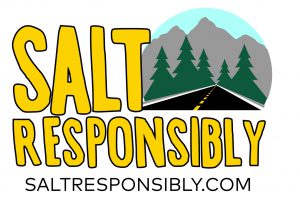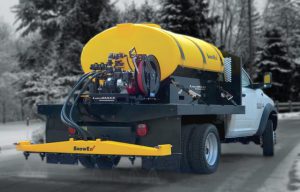FOR IMMEDIATE RELEASE January 18, 2022
Contact: Matt Howe, 603-539-1859 director@gmcg.org
Salt Responsibly!
GMCG Launches Winter Road Salt Awareness Campaign
Effingham, NH: Green Mountain Conservation Group (GMCG) has announced the launch of a public awareness program addressing the threats winter salt application pose to New Hampshire’s environment, economy, and the health of its citizens. The “Salt Responsibly” campaign will focus attention on a multitude of ways to reduce the use of salt while keeping roads, driveways, parking lots, and sidewalks safe throughout the long New Hampshire winter.
“The facts are in,” stated GMCG Executive Director Matt Howe. “New Hampshire’s freshwater lakes, streams, wetlands, and groundwater are becoming saltier each year, and the leading cause of that is the 400,000 tons of salt applied every winter to our parking lots, sidewalks, town roads, interstate, state highways, and other surfaces. Salt is toxic to aquatic life and plants, it corrodes our bridges and vehicles, and when it permeates our drinking supply it jeopardizes human health.”
Radio, newspaper, and social media messaging will direct the public to www.saltresponsibly.com to learn about the harm caused by winter salt applications and offer guidance to reduce the amount of salt that is contaminating New Hampshire’s waterways and water supplies.
“The purpose of this campaign is not to cast blame,” added Howe. “We recognize that safety is the first priority of those responsible for winter road maintenance, and until the day that practical alternatives are widely available, winter salt use will continue. The real problem is oversalting. Reducing waste and increasing the efficient use of salt are the key solutions. We seek a broader public understanding of the problem and to share information about the steps everyone can take to make a difference.”
For nearly two decades, GMCG has conducted comprehensive water quality monitoring at dozens of sites in the Ossipee Watershed. Earlier this year, GMCG Water Quality Coordinator Jill Emerson and her team of AmeriCorps members and community volunteers released a report summarizing the last 15 years of data collection. “What is alarming,” notes Emerson, “is there has been a significant increase in salinity levels at 85% of the sites we test, with surface water readings at several sites that pose a potential threat to the aquatic environment and the organisms who live there.”
GMCG’s data mirror findings from across the State. The New Hampshire Department of Environmental Services (NHDES) currently recognizes 50 NH water bodies as “chloride-impaired” based upon federal Clean Water Act (CWA) standards. In 2008, only 18 New Hampshire water bodies failed to meet CWA standards.
Commercial salt applicators are responsible for the majority of winter salt applied to traveling surfaces in New Hampshire. GMCG collaborates with the University of New Hampshire (UNH) Technology Transfer Center to promote and deliver NHDES’s highly regarded Green SnowPro certification program. This program is the first in the nation to train and certifies commercial salt applicators on the latest methods and technologies to safely reduce the use of salt. Municipalities are the second highest contributor of winter salt applications in the state and they are soon to be eligible for Green SnowPro certification alongside the thousands of commercial salt applicators already in the program.
“As GMCG launches the Salt Responsibly campaign, we want to underscore the leadership role that UNH, NHDES, and the New Hampshire Department of Transportation have played in the effort to safely reduce winter salt application,” added GMCG Education Coordinator Tara Schroeder. “New Hampshire has made much progress, and I hope this campaign will help further increase participation in Green SnowPro and mobilize the public and more municipalities to take salt reduction seriously.”
Visitors to the campaign website will learn about how one New Hampshire municipality, the Town of Madison, has recently invested in a brining dispenser. Brining, a process that liquifies salt before it is applied to roadways and other surfaces, has been found to be more effective in melting ice and snow while reducing salt applications by more than 50%. In the face of rising costs – commercial salt prices are at least 25% higher for most NH towns this winter – brining offers a significant financial incentive as well.
“GMCG’s mission is to protect the Ossipee Watershed and the Ossipee Aquifer,” noted Howe. “Yet we would like this message to extend across the state and beyond our borders. Everyone in New Hampshire lives in a watershed. As citizens of a watershed, we all have a responsibility to keep in mind that virtually everything we add to the land eventually ends up in our water.”


